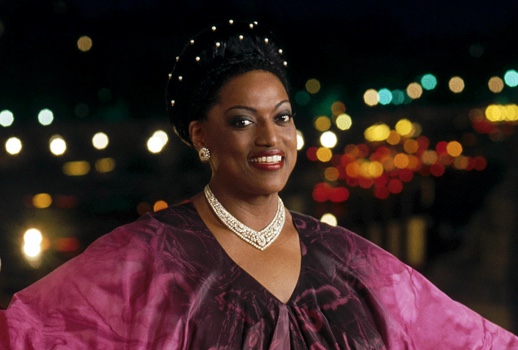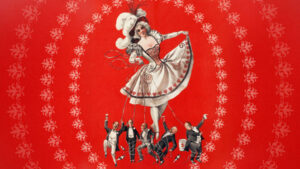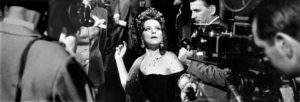
I’m not sure how much of Isolde’s Transfiguration I heard. I don’t remember her voice. What I remember is the look on her face. She was in another world. And so was Mehta. As the final chord finished, the audience burst into rapturous applause but Jessye and the maestro were still somewhere else. I thought how wonderful it must be to achieve such transcendence. I was utterly beguiled.
Later, I saw her again on the Met’s televised Ring Cycle. I got permission from my parents to stay up late each night and watch all four instalments (I was groggy in school the following mornings but it was totally worth it). It was a transformative experience, though obviously not just because of Jessye’s participation.It was during the Walküre broadcast that I actually got to register her voice. I had been previously enamoured with her glamour. But when I paid attention the voice, I knew that I had chosen well. Jessye would be my diva for life.
It’s not surprising that I was enchanted by her glamour. With her majestic presence, sculpted face, magnetic eyes, dazzlingly radiant smile, and a heavy dose of that indescribable “it” factor, Jessye had glamour for days. Through the course of her career, she cultivated it.
And it is fair to say that, by the 1990s she had overshot on the glamour mark. She had crossed the line into affectation. But in later years, she found a happier balance and her persona was more down to earth. She settled as a gracious goddess.
Intertwined with her glamour was her grandeur, of which she had enough for ten historic divas, and her charisma. It was that charisma that captured the imagination. I believe it is that charisma that has contributed to the remarkable outpouring of tributes in the wake of her sudden passing.
The New York Times published not one, not two, but three articles on the following day. The Guardian posted six items in two days. The news made it to TV. CNN posted two separated articles. Social media is still grieving.
No, I’m not forgetting her voice. That instantly recognisable voice. Comparisons are pointless; there was no other like it. Superlatives abounded when people tried to describe it. I once it heard it described as the “dark continent”. In addition to its distinctive tone – both molten and shimmering – there was the remarkable range, from the low D to high C.
There’s no doubt that she was quite at home in mezzo soprano music. She was a true soprano, but best described as a Falcon. The voice didn’t soar endlessly on top. In her prime, it stopped soaring around a high A, give or take a semi-tone depending on the day.
The lower centre of her voice meant that her voice thrived around F and F# where most sopranos are negotiating their passaggio. Her unique voice, combined with her adventurous musical tastes, resulted in a fascinating career.
It has been said that Jessye had the career that she wanted. She famously said that pigeonholes are only comfortable for pigeons. But the start of her career was rather conventional in a way that harkens back to how star careers in the first half of the 20th century.
When she was coming up, there were no artist apprenticeship programs so she wasn’t singing comprimario roles while preparing for her big time career. And she got noticed right away. So, no Gutrune or Third Norn for her.
She won the Met Council Auditions in 1968 but the definitive moment in launching her career was winning the ARD International Competition in Munich. Following that win, at age 24, she was given her big break with a single performance of Elisabeth in Tannhäuser at the Deutsche Oper.
She had no stage rehearsal and she was grateful to Elisabeth Grummer who gave her pointers on how to navigate the raked stage, having sung in the production before. The performance was enough of a success that the intendant, Egon Seefehlner, was in her dressing room with a contract during the intermission between the second and third acts. She replied that she should probably talk to her father before signing.
A flurry of debuts followed. Within a few years, she made debuts in Florence, London, Milan and Paris. And she didn’t step in gingerly. Her roles were Aida, Cassandre and Selika. Not yet 30, she had already sung on more storied stages than most. At the Deutsche Oper, she was put on a dramatic soprano track.
And after a few years, she hit the stop button. She disappointed Seefehlner by turning down his offer of Ariadne and quitting the opera stage altogether. By age 30, she had no more opera contracts left and focused solely on concerts and recitals.
During her hiatus, she figured out her unique voice. It had always been remarkable instrument of seemingly endless potential, but it was also unfinished. She notably had pitch problems, especially in the upper mid-voice. By the Eighties, her “golden decade”, she was at her zenith.
She dropped conventional soprano roles like Aida. In 1980, she made her return to the opera stage in Vienna, once again invited by Seefehlner, in the role of Ariadne. A new chapter had begun. From then on, she focused on low-lying soprano roles like Ariadne, Sieglinde, and Cassandre. She also embraced mezzo roles like Didon and Jocasta. She caused a sensation at the Opéra Comique with Purcell’s Dido.
Missing among her flurry of debuts in European capitals was an appearance at the Metropolitan Opera. According to her book, Stand up Straight and Sing, there had been offers but nothing mutually acceptable had been found. But finally, in 1983, her debut came in her country’s most important stage.
And what a debut: the opening night of the Met’s Centennial season. The production, a stodgy Les Troyens, was the biggest in the Met’s repertoire. Her co-stars, Placido Domingo and Tatiana Troyanos, were as major as they come.
But she still stole the evening. The New York Times published an article called “In the Wake of a Triumph”, catching up with her the following day. She would be a dominant figure at the house, and a favourite of James Levine, for the following 13 years.
All the while, her concert work was prominent in her schedule. She became a leading component of the song repertoire. Out side of the recital hall, she became a Mahler specialist. If she had done nothing but sing Mahler, she would have left an indelible mark.
She carried on the tradition Kathleen Ferrier, Maureen Forrester and Christa Ludwig. The warmth of tone, the generous phrasing, and most crucially, the utter sense of repose, made her an ideal interpreter. She had just the right vocal colour and range for the music, and unlike contraltos, her voice didn’t hit a ceiling on the highest phrases, allowing the music to shimmer and float. Her recording of “Ich bin der Welt abhanden gekommen” with Irwin Gage, made while only 26, displays an artist of remarkable maturity.
I’ve never heard the alto solo of Mahler’s “Resurrection” Symphony, the “Ullricht” sung quite like this. The opening notes evoke a pipe organ. The control of the line is sovereign – grave with emotion, ethereal as it ascends – yet the expression is urgent. It is about as idea a rendition of any vocal piece I’ve heard.She sang a fair amount of Italian music, but it wasn’t her musical home. She notably recorded a couple of early Verdi operas, and Aida was a frequent role in the first few years. Later, she recorded Santuzza. But I never found her stylistically at home in that music, the single exception being the alto part in Verdi’s Requiem.She sang the soprano role a few times and there is recorded evidence that shows she was worth hearing in the part. But at the 1981 Edinburgh Festival, the scheduled mezzo had to drop out and Margaret Price was already in town or nearby. So, Price sang the soprano part and Jessye learned the mezzo part. She put down one of the finest renditions of the part on recording, commanding in her solos, and perfectly calibrated with Price in duets.
httpvh://youtu.be/gOp7q-ZZIpY?t=917
Jessye only sang in languages she spoke. This meant that she was also persuasive with the text. But it also created frustrations. Many of us wanted to hear her in Russian music. She longed to sing Russian music, she said. And according to her autobiography, she even hired a Russian tutor to accompany her on tour. But it never worked out; she was too busy in her career by then. So, we never got Mussorgsky’s Marfa.
The frustrations went the other way too. Many Janacek fans were disappointed that the Met premiere of The Makropulos Affair was given in English, and they blamed Jessye who insisted on it.
Like any legendary diva, she had her share (OK, more than her share) of idiosyncrasies, whether it was in her stage manner, her not-quite-from-Georgia accent, or her musical choices. But her charisma swept everything and everyone along with her.
Her Carmen recording was controversial. She sang possibly the slowest rendition of the Habenera on record but she did it with musicality and flare. Music fans will all have their own examples of pieces in which Jessye sang too slowly, or too grandly, or with too much self-consciousness.
But she always made a compelling case. She worked hard to present the most polished, convincing case for her particular musical vision. One didn’t have to like it, but the finished product demanded respect.
One thing that was undeniable was her musical curiosity. She had a connoisseur’s taste in music. The conventional operatic and song repertoire provided her with ample opportunity to explore the different facets of her voice and artistry. But she went further than the conventional. She embraced Berg and Schönberg. In the latter part of her career, she collaborated with contemporary composers. She branched out into blues and jazz.
httpvh://youtu.be/S400_grs9sk
Dramatically, she had a limited interpretive palette. Grandeur was her strength; vulnerability was not. I often wished that she had essayed a few villains. Her imposing grandeur would have translated into fierce drama. Many of us hoped for a late career Klytemnästra but she wasn’t interested.
Her lack of vulnerability resulted in some glorious singing that didn’t necessarily hit the dramatic mark. Her Judith enters Bluebeard’s castle as a regal queen, rather than an apprehensive bride. Her recorded Elsa threatened to overwhelm her Ortrud. Her Sieglinde was proud, an unknowing daughter of a god. It wasn’t dramatically to every taste but it was gorgeously intoned.
In my early days of opera fandom, I saw her a few times in concert. I enthusiastically bought a front row ticket to a concert with the Toronto Symphony Orchestra and Gunther Herbig in which she sang Wagner’s Wesendonck Lieder and Isolde’s Transfiguration. The seat was too close. I could feel the sheer amount of sound she produced penetrate my torso.Her recitals introduced me to world of the song repertoire. Without her influence, I would have probably stuck to Puccini’s and Verdi’s greatest hits. But she introduced me to the lieder of Schubert and Schumann, Ravel and Chausson. Her attention to text and ability to create a world out of the smallest songs made her a magnificent interpreter of songs.
She also introduced me to the world of spirituals. She brought her greatest passion to these songs and used her monumentality to give them compelling weight. She made a case for these songs to be considered as seriously as those of her beloved Brahms.In addition to the opera and concert stage, Jessye was frequently called upon to sing at important public occasions. She sang for presidents and monarchs (apparently president Jimmy Carter had made her promise to sing at his funeral). She closed the opening ceremonies of the Atlanta Olympic games. She famously draped herself in the French flag and sang the “La Marseillaise” for the bicentennial of French revolution.Outside of the music world, she was always and unabashedly interested in social issues. She proudly recognised her African American heritage. “I do not consider my blackness a problem. I think it looks rather nice”, she said.
Her passion for human rights and her stature as a singer who had captured the public’s imagination outside of the classical music world came together at Nelson Mandela’s 70th Birthday Tribute concert.
It was an 11-hour concert at Wemblely Stadium. The performers were the most popular musicians of the day: Sting, Whitney Houston, Stevie Wonder, Peter Gabriel. Jessye was the final performer. The audience was drunk and rowdy. Dire Straits had finished their set and out walked this opera singer who was likely unfamiliar to many in the audience.
Jessye sang her signature “Amazing Grace” without accompaniment. Not only was she unaccompanied but she also dared to sing the song as slowly as probably any of them had ever heard it. The audience was noisy at first – they were in the mood to party – but she won over the crowd through the sheer power of her voice and force of her personality. They listened raptly. Fireworks followed.
Thank you, Jessye.




